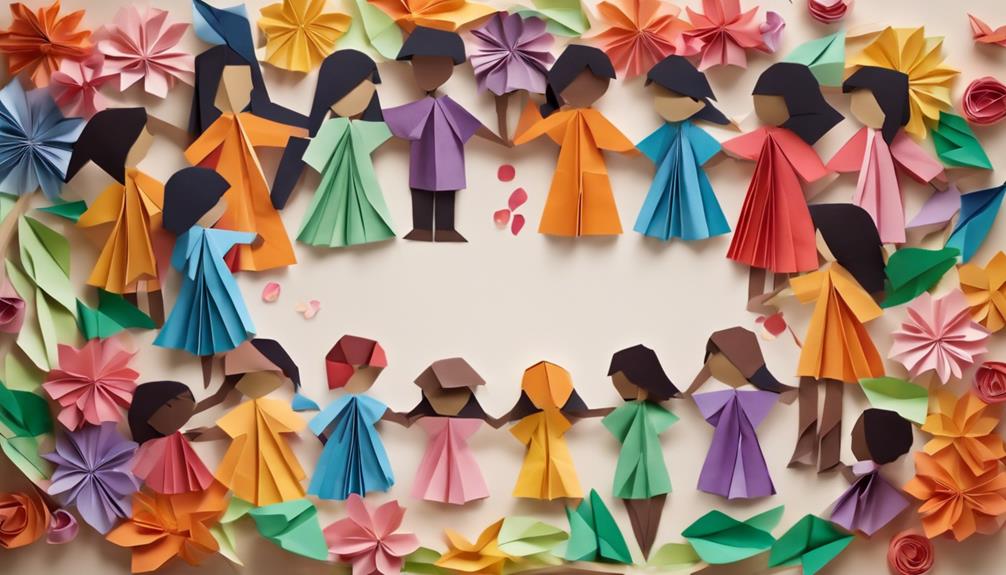Kindness, often underestimated, has a profound impact on individuals and society, extending far beyond its perceived role in fostering warm feelings. It shapes young minds, fostering empathy, compassion, and emotional resilience. Kindness boosts happiness and well-being, triggering the release of feel-good hormones, and leads to stronger, more meaningful relationships. It has significant health benefits, releasing oxytocin, dopamine, and serotonin, which contribute to improved mental health and stress coping. By cultivating kindness, individuals can create a ripple effect, inspiring a chain reaction of positive actions in their communities, ultimately building a better world. As they explore the importance of kindness, they will discover even more surprising ways it transforms lives and communities.
Key Takeaways
- Kindness enhances empathy and resilience, fostering essential life skills, confidence, and self-esteem in young minds.
- Acts of kindness release feel-good hormones, promoting emotional well-being, happiness, and a positive ripple effect.
- Kindness boosts self-esteem and confidence, leading to stronger, more meaningful relationships and effective communication.
- Performing kind deeds triggers a chain reaction of positive actions, breaking down social barriers and promoting inclusivity.
- Instilling kindness in children shapes their young minds, fostering empathy, compassion, emotional resilience, and gratitude.
Kindness Shapes Young Minds
By instilling kindness in children from a young age, parents and educators can lay the groundwork for a lifetime of empathetic relationships and positive social interactions. This early foundation of kindness shapes young minds, fostering empathy and compassion that extends far beyond childhood.
Additionally, kindness in youth development has been shown to increase emotional resilience and gratitude, contributing to overall well-being. By cultivating empathy through discussions and modeling kindness, parents and educators can help build a more compassionate and understanding generation.
As kindness takes root, children's self-esteem grows, creating a ripple effect of positive feelings and behaviors. By prioritizing kindness in youth development, we can shape a brighter, more empathetic future.
Empathy and Resilience Grow

Cultivating kindness in children sparks a profound impact on their emotional development, as it greatly enhances their capacity for empathy and resilience. By fostering kindness, children develop essential life skills, such as understanding and relating to others' perspectives, and coping with adversity. This, in turn, boosts their confidence and self-esteem, shaping them into compassionate and considerate individuals.
Here are three key benefits of cultivating kindness in children:
- Empathy growth: Kindness helps children develop empathy, an essential skill for building strong relationships and understanding others.
- Resilience development: Kindness fosters feelings of happiness, gratitude, and reduces stress, contributing to a child's resilience.
- Confidence boost: Acts of kindness help develop confidence and self-esteem in youth, promoting a positive self-image and sense of worth.
Happiness Multiplied Through Acts

Moreover, as children practice kindness, they not only spread joy to others, but also experience a significant uplift in their own happiness and well-being. Engaging in acts of kindness has been shown to boost happiness and overall satisfaction. This is because kindness triggers the release of feel-good hormones such as oxytocin, dopamine, and serotonin in the brain, promoting feelings of joy and fulfillment.
By practicing kindness, individuals can cultivate a deeper sense of connection and purpose, enhancing their emotional well-being and creating a more harmonious society. Moreover, kindness creates a positive ripple effect, spreading happiness and positivity to others in a chain reaction of goodwill. As individuals engage in regular acts of kindness, they can expect to experience increased levels of happiness and well-being.
This, in turn, can have a profound impact on their overall quality of life, leading to a more fulfilling and purpose-driven existence. By incorporating kindness into daily life, individuals can reap the rewards of a happier, healthier, and more harmonious life.
Confidence Boost and Strong Bonds

Practicing kindness helps children and teens develop a more positive self-image, as it boosts their self-esteem and confidence. This confidence boost enables them to navigate social situations more effectively, leading to stronger, more meaningful relationships.
By fostering empathy and compassion, kindness teaches individuals to take into account the feelings and needs of others, ultimately creating strong bonds.
Here are three key benefits of kindness in building confidence and strong bonds:
- Confidence boost: Kindness helps individuals develop a more positive self-image, leading to increased confidence and self-esteem.
- Strong bonds: Acts of kindness create strong, meaningful relationships built on empathy and compassion.
- Effective communication: Kindness fosters effective communication skills, helping individuals navigate social interactions with ease.
Health Benefits of Kind Deeds

Performing kind acts triggers a cascade of positive effects on both physical and mental health, releasing feel-good hormones that promote overall well-being.
When individuals engage in helping others, they experience a surge in oxytocin, dopamine, and serotonin levels, which enhances their mental health and sense of belonging.
Regular acts of kindness help maintain the benefits of these feel-good hormones in the brain, leading to increased happiness, optimism, and satisfaction.
By serving others, individuals can rewire their brain for happiness, fostering empathy, compassion, and resilience. This, in turn, contributes to improved mental health and a greater sense of well-being.
Kindness has a profound impact on an individual's mental health, enabling them to better cope with stress and adversity.
Stronger Communities Thrive Here

When kindness is woven into the fabric of a community, it fosters an environment where neighborhood unity grows and support networks flourish.
As a result, residents experience a stronger sense of belonging, leading to increased cooperation and social cohesion.
Neighborhood Unity Grows
Stronger communities thrive in neighborhoods where residents know and look out for one another, fostering an environment of trust and cooperation. Neighborhood unity grows when residents prioritize kindness, leading to a range of benefits for the community. In these close-knit neighborhoods, residents often report higher levels of overall well-being and life satisfaction.
Research has shown that neighborhood unity is associated with increased feelings of safety and belonging. In fact, strong communities are linked to lower crime rates and better mental health outcomes.
Here are just a few ways that neighborhood unity grows:
- Increased trust: When residents look out for one another, trust and cooperation flourish.
- Sense of belonging: Neighborhood unity fosters a sense of belonging among residents, leading to increased feelings of safety and well-being.
- Social support networks: Building neighborhood unity can lead to increased social support networks and a sense of shared responsibility among residents.
Support Networks Flourish
In neighborhoods where residents prioritize kindness, support networks flourish, fostering a sense of mutual aid and empathy that strengthens community bonds. When kindness matters, residents are more likely to help others, creating strong support networks that benefit the entire community.
These networks are characterized by mutual aid, empathy, and a sense of belonging, leading to increased resilience, well-being, and positive social interactions. As a result, communities with strong support systems experience lower levels of isolation and loneliness.
By promoting kindness, generosity, and a culture of mutual assistance, support networks play an essential role in building stronger, more thriving communities. In neighborhoods where support networks flourish, residents are more likely to look out for one another, creating a culture of kindness and cooperation.
This, in turn, fosters a sense of community and belonging, making neighborhoods more desirable places to live. By prioritizing kindness and building strong support networks, communities can create an environment where everyone can thrive.
Ripples of Kindness Matter

Through their far-reaching impact, acts of kindness create a profound ripple effect that resonates beyond the immediate recipient, inspiring a chain reaction of compassion and empathy in those who witness them. This ripple effect isn't limited to the immediate interaction, but rather spreads to influence relationships and foster a culture of compassion and empathy.
The power of kindness lies in its ability to inspire others to pay it forward, leading to a chain reaction of positive actions in a community. Even small acts of kindness, such as a smile or a kind gesture, can have a significant impact on someone's day and overall well-being.
Here are three ways the ripples of kindness matter:
- Influencing relationships: Kindness can strengthen relationships and build stronger bonds between individuals.
- Fostering a culture of compassion: Consistently practicing kindness contributes to a more connected and caring society.
- Inspiring a chain reaction: Small acts of kindness can inspire others to pay it forward, leading to a chain reaction of positive actions in a community.
The Kindness Effect on Youth

As educators and caregivers, it's paramount to acknowledge the profound impact of kindness on youth, especially in building emotional intelligence and fostering empathetic relationships.
By instilling kindness in young individuals, they develop essential life skills, such as self-awareness, empathy, and effective communication, which are vital for their social and emotional growth.
Building Emotional Intelligence
By incorporating kindness into their daily lives, children develop a stronger sense of emotional intelligence, which fosters empathy, compassion, and healthy relationships. Teaching kindness to children is essential for their emotional and social development. Kindness positively impacts youth by promoting social interactions and building strong relationships. Acts of kindness in youth contribute to reducing stress levels and boosting overall well-being.
Here are three ways kindness builds emotional intelligence in children:
- Enhances empathy: Kindness helps children understand and appreciate the feelings of others, leading to more harmonious relationships.
- Cultivates self-awareness: Practicing kindness helps children develop a better understanding of their own emotions and needs.
- Fosters healthy relationships: Kindness promotes positive interactions with others, leading to stronger, more meaningful relationships.
Fostering Empathetic Relationships
Children who practice kindness develop a deeper understanding of others' feelings, leading to more empathetic and supportive relationships. This understanding is essential in fostering empathetic relationships among youth, which are necessary for building strong, supportive connections.
Kindness education plays an important role in shaping the next generation to prioritize empathy, compassion, and understanding in their relationships. By incorporating kindness into their daily lives, young individuals can develop a culture of empathy and understanding, promoting more positive social interactions.
Acts of kindness among youth contribute to a more positive and inclusive community, fostering empathetic connections that last a lifetime. By teaching kindness, we can cultivate a generation that values empathy and compassion, leading to stronger, more supportive relationships.
Fostering empathy through kindness education is crucial in helping young individuals develop a deeper understanding of others, leading to more meaningful and lasting relationships.
A Better World Unfolds

Through collective efforts, kindness sparks a chain reaction that transforms the world into a harmonious and compassionate society. As individuals come together to spread kindness, they create a ripple effect that resonates throughout communities. This collective kindness can make the world a better place, one act at a time.
Here are three ways kindness can make a significant impact:
- Fosters a sense of community: Acts of kindness bring people together, promoting positive interactions and a sense of belonging.
- Triggers a chain reaction: One act of kindness inspires others to pay it forward, creating a wave of compassion that spreads far and wide.
- Breaks down social barriers: Kindness knows no boundaries, bridging gaps between individuals from diverse backgrounds and fostering empathy and understanding.
As kindness becomes a core value in society, the world begins to transform. Regular acts of kindness contribute to a more empathetic and understanding society, where everyone has the opportunity to thrive. By encouraging others to join in spreading kindness, we can create a significant impact on societal well-being.
Frequently Asked Questions
What Is a Fact About the Importance of Kindness?
She notes that one key fact about the importance of kindness is that it triggers the release of feel-good hormones like oxytocin, dopamine, and serotonin, leading to increased happiness and life satisfaction.
Why Kindness Is More Important Than Anything?
She believes kindness is more important than anything because it's literally the key to happiness, rewiring the brain for pure bliss, and spreading contagious positivity that benefits everyone involved, creating a utopian world!
What Are the Negative Effects of Kindness?
She highlights that excessive kindness can lead to feelings of burnout, exhaustion, and resentment when prioritizing others' needs over one's own, resulting in unfulfillment and potential exploitation.
Why Is Kindness a Problem?
She finds it ironic that kindness, a trait meant to uplift, can actually be a problem when it's perceived as a weakness, allowing others to take advantage, and creating unrealistic expectations.
Can Kindness Play a Role in the Messages Delivered by Top Christian Speakers?
Top christian speakers inspire faith through their messages, and kindness can certainly play a pivotal role in delivering these messages. By embodying kindness in their words and actions, these speakers can create a powerful and genuine connection with their audience, making their faith-based messages even more impactful and transformative.
Conclusion
As kindness takes root, it weaves a tapestry of compassion, strengthening the fabric of society.
Like a master gardener, kindness nurtures young minds, cultivating empathy and resilience.
As ripples of kindness spread, they form a boundless web of connections, fostering stronger communities and a better world.
In this symphony of compassion, every act of kindness plays a crucial note, resonating with the power to shape a brighter future.









